You are here
 January 02 2023
THE "MENACE" FROM VENICE: PAOLI SARPI (1552 -- 1623)
January 02 2023
THE "MENACE" FROM VENICE: PAOLI SARPI (1552 -- 1623)
He withstood papal discipline, resisting an interdict imposed upon his native city over a number of years (1605-7), and proposed that Venice ought to have a "free church" with a homegrown liturgy and a toleration for Protestantism. It is this religious tendency that is the concern of this brief article. Sarpi remained Catholic as was his preference, but he harbored a high regard for Reformed Anglicanism.
Read more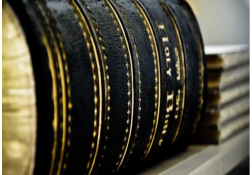 December 20 2022
TENDER MERCY: THOMAS CRANMER ON THE LORD'S SUPPER AND GRACE ALONE
December 20 2022
TENDER MERCY: THOMAS CRANMER ON THE LORD'S SUPPER AND GRACE ALONE
The martyred Archbishop of Canterbury, Thomas Cranmer, was responsible for creating the Book of Common Prayer (1549, revised 1552), the historic Reformation prayers of the Church of England. His liturgy of the Lord's Supper brings the gospel essentials into wonderfully clear focus with its emphasis on salvation by grace alone through faith alone in Christ alone. This essay briefly summarizes Cranmer's central priorities.
Salvation by grace alone through Christ alone
Read more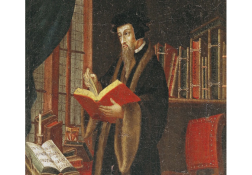 December 03 2022
PREDESTINATION: THE TOUCHSTONE OF AUTHENTIC ANGLICANISM: PREAMBLE AND THE PLIGHT OF ANGLICANISM
December 03 2022
PREDESTINATION: THE TOUCHSTONE OF AUTHENTIC ANGLICANISM: PREAMBLE AND THE PLIGHT OF ANGLICANISM
Edward Norman in his publication Anglican Difficulties observes, "This, it must be noted, is in considerable contrast to its noble past and steadfast adhesion to its own tradition of Christian understanding. That was, it is true, a thoroughly Protestant tradition, as reference to the teachings in the Book of Common Prayer, in the Articles of Religion, and in the Homilies, will make plain.
Read more November 16 2022
What Do Anglicans Believe? An Overview of Anglican Beliefs
November 16 2022
What Do Anglicans Believe? An Overview of Anglican Beliefs
Orthodoxy means "right belief," and for Christianity, a right belief is a belief that agrees with the whole of Scripture and the teachings of Jesus and the apostles. This is especially true regarding the core doctrines of the Trinity and the Church.
Read more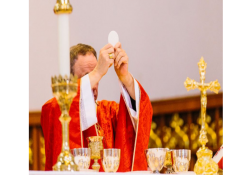 November 09 2022
TRANSUBSTANTIATION?
November 09 2022
TRANSUBSTANTIATION?
Why is it important that we get this right? Because the other biblical core matters that were recovered at the time of the English Reformation (Holy Scripture as our authority, the priesthood of all believers, and the central doctrine of justification by grace through faith alone) hinges on how we view "real presence" in the sacrament. The sixteenth century English reformers knew this and they were willing to die for their understanding of "real presence" in the sacrament, as many did.
Read more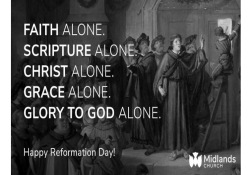 November 03 2022
REFORMATION--16TH CENTURY AND TODAY
November 03 2022
REFORMATION--16TH CENTURY AND TODAY
The Background to what brought this about
The Reformation--Key ideas (esp. Sola Scriptura), Parallels to Today, and Call to Action
The last two points are really where I'm going with this as I hope I'm able to illustrate why we are living in a reformation age right now and what we all should be doing about it.
I. BACKGROUND TO THE PROTESTANT REFORMATION
Read more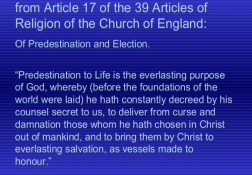 October 30 2022
OUR GLORIOUS SEVENTEENTH!
October 30 2022
OUR GLORIOUS SEVENTEENTH!
Whereby (before the foundations of the world were laid) he hath constantly decreed by his counsel secret to us: This compassionate decision of God precedes the creation of the world and its human inhabitants. It is timeless and unchangeable; his eternal counsel is unreachable and unfathomable to us, beyond our prying eyes or probing enquiry. God's in-depth intent is private to him alone. His thoughts are lofty and his reasons for anything do not have to be seconded by us for their validity.
Read more October 20 2022
"Anglicans are not Arminians. We are Moderate Calvinists" -- Chuck Collins
October 20 2022
"Anglicans are not Arminians. We are Moderate Calvinists" -- Chuck Collins
I'd really like to know how it is that the Church of England started with a firm commitment to moderate Calvinism (Calvin before Calvinism: the message of the Anglican formularies), but after Edward VI, Elizabeth I, and James I the colors of the church changed to Arminianism (often called "Pelagian": see Article IX)?
Read more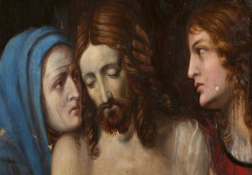 October 17 2022
WOMEN AND MEN IN MINISTRY
October 17 2022
WOMEN AND MEN IN MINISTRY
DIFFERENT CHARISMS
Read more October 11 2022
Catholic vs Protestant: The Dividing Line is Justification by Faith
October 11 2022
Catholic vs Protestant: The Dividing Line is Justification by Faith
Catholics believe that justification (salvation) is a process by which a person is incrementally made righteous by the infused righteousness of grace in the sacraments. Protestants, on the other hand, believe that we are never righteous enough, not innately and not in this lifetime; therefore our hope and salvation depends on another's righteousness: Christ's own righteousness credited (imputed) to our account. This is the gospel of which St.
Read more


